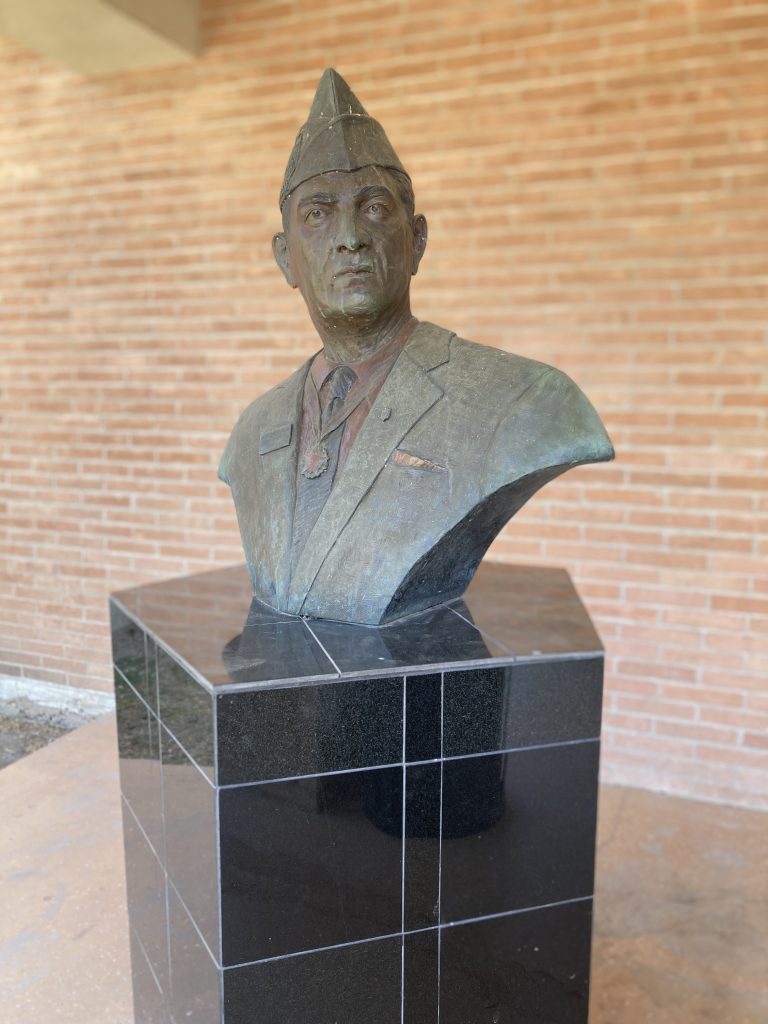Dr. Hector P. Garcia Bio
Dr. Hector P. Garcia Bio

In Mercedes, Texas, where Dr. Hector and his family came to live in 1917, facing prejudice and discrimination was an everyday experience for Mexican Americans. Hector’s father, an educator with Mexican teaching credentials which were denied in Texas, ran a dry goods store with his brothers. He was determined that his children would overcome the impacts of prejudice through education. He vowed all of his children would become doctors and six of the ten did. He taught them pride in their western and indigenous heritage giving four of them names of Mayan royalty while Hector was named after the Iliad’s hero of Troy.
However it soon became obvious that even an education could not by itself overcome prejudice. He graduated from a segregated elementary school and was told in high school by his English teacher, “No Mexican will ever get an ‘A’ in my class.” After graduating from the University of Texas at Austin he was admitted to medical school at University of Texas at (UTMB) Galveston. Only one Mexican American was allowed such admission in the state of Texas each year.
Discrimination was pervasive. When it became time to do his internship no Texas hospital would accept a Mexican American and he traveled to Nebraska to learn his practice. He completed a surgical residency in 1942 and joined the army. Because he was a “Mexican” doctor, he was given command of an infantry company in North Africa, and later, a company of battlefield engineers before gaining entrance to the Medical Corps first as a corpsman. He eventually rose to command a surgical unit in Italy.
Prejudice existed in the military but with a wider degree of tolerance than in civilian life, especially in combat theaters. Hispanics were not segregated like blacks into their own unit but sent to Anglo or Black units depending on their skin color. Europeans had little prejudice against Mexican or Black Americans. American minorities many times experienced better treatment from their allies than they did back home.
While in Italy, Dr. Hector met and married Wanda Fusillo who had earned a doctorate in classical literature at the University of Naples. His new bride’s family urged Dr. Hector to stay in Europe and avoid the impacts of prejudice in his native land. Dr. Hector declined, stating he had a mission when he returned home. Dr. Hector separated from the United States army with the rank of major and earned the Bronze Star Medal, the European-African-Middle Eastern Medal with six Bronze Stars and the World War II Victory Medal.
Upon their return to Corpus Christi, Hector and Wanda crashed headlong into the reality that prejudice and discrimination were still alive and well in South Texas. Dr. Hector responded by refusing to accept that the Constitution didn’t apply to everyone. He began a medical practice with his brother in Corpus Christi serving the poorest minorities in the community. He joined the League of United Latin American Citizens (LULAC), was elected its president in 1947 and founded the American GI Forum in 1948.
LULAC had already begun the fight for equal rights. The American GI Forum arose out of veterans issues but quickly expanded into social justice causes. Dr. Hector and veterans of all races were being denied the promised benefits they needed to transition back to civilian life. The American GI Forum was founded to organize veterans into a political force to ensure those benefits were provided.
All veterans, especially minorities came home with a new self-respect, they were sure they had paid for their rights on the battlefield. Dr. Hector believed that all Americans were guaranteed certain rights. He quoted the Constitution and Declaration of Independence freely as the foundation of his arguments. Under Dr. Hector’s leadership the American GI Forum and LULAC grew quickly and were able to challenge any institution that would deny rights to those who had so valiantly fought and died in service to our country.
When asked how he and the American GI Forum could deliver 95% of the Hispanic vote, Dr. Hector had previously explained that his medical practice was with the poor, and that much of the mission of LULAC and the American GI Forum was to provide support for families and to build communities, to promote education and pride. He went on to explain the relationship between the communities and the leadership, “So, this is the trust and respect that we have established by being faithful to our people for twenty years. There’s nothing else, we have no machinery. And we won like this throughout the nation, the same way.”
In 1948, the Felix Longoria incident in Three Rivers, Texas put the national spotlight on Dr. Hector and the American GI Forum, it also began a relationship with then Senator Lyndon Johnson that became instrumental in Dr. Garcia’s future influence on national affairs. Dr. Hector was instrumental in their election, organizing the Viva Kennedy-Johnson Clubs that delivered the Hispanic vote to Kennedy. It is certainly arguable that Garcia’s efforts won the Hispanic vote and hence election for Kennedy. Johnson continued to work closely with Dr. Hector when he became President and appointed him to the United States Commission on Civil Rights in 1968.
Dr. Hector went on to become a trusted adviser and appointee of every President from Kennedy through Clinton. He was appointed as an alternate Ambassador to the United Nations and was the first American to address that body in a language other than English. Dr. Garcia was awarded the Presidential Medal of Freedom the nation’s highest civilian honor, in 1984.
Kelley, John. (2013, January). A Legacy of Justice. Retrieved from www.drhectorpgarciafoundation.org
